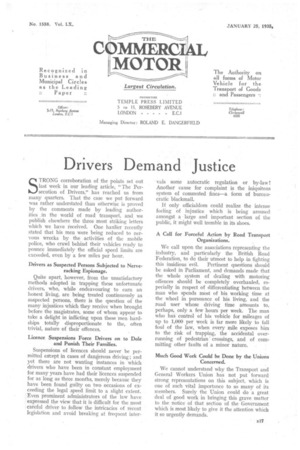Drivers Demand Justice
Page 35

If you've noticed an error in this article please click here to report it so we can fix it.
STRONG corroboration of the points set out last week in our leading article, " The Persecution of Drivers," has reached us from many quarters. That the case we put forward was rather understated than otherwise is proved by the comments made by leading authorities in the world of road transport, and we publish elsewhere the three most striking letters which we have received. One haulier recently stated that his men were being reduced to nervous wrecks by the activities of the mobile police, who crawl behind their vehicles ready to pounce immediately the official speed limits are exceeded, even by a few miles per hour.
Drivers as Suspected Persons Subjected to Nerveracking Espionage.
Quite apart, however, from the unsatisfactory methods adopted in trapping these unfortunate drivers, who, while endeavouring to earn an honest living, are being treated continuously as suspected persons, there is the question of the many injustices which they receive when brought before the magistrates, some of whom appear to take a delight in inflicting upon these -men hardships totally disproportionate to the, often trivial, nature of their offences.
Licence Suspensions Force Drivers on to Dole and Punish Their Families.
Suspensions of licences should never be permitted extept in cases of dangerous driving ; and yet there are not wanting instances in which drivers who have been in constant employment for many years have had their licences suspended for as long as three months, merely because they have been found guilty on two occasions of exceeding the legal speed limit to a slight extent. ' Even prominent administrators of the law have expressed the view that it is difficult for the most careful driver to follow the intricacies of recent legislation and avoid breaking at frequent inter vals some autocratic regulation or by-law Another cause for complaint is the iniquitous system of commuted fines—a form of bureaucratic blackmail.
If only officialdom could realize the intense feeling of injustice which is being aroused amongst a large and important section of the public, it might well tremble in its shoes.
A Call for Forceful Action by Road Transport Organizations.
We call upon the associations representing the industry, and particularly the British Road Federation, to do their utmost to help in fighting this insidious evil. Pertinent questions should be asked in Parliament, and demands made that the whole system of dealing with motoring offences should be completely overhauled, especially in respect of differentiating between the man who spends most of his working time at the wheel in pursuance of his living, and the road user whose driving time amounts to, perhaps, only a few hours per week. The man who haS control of his vehicle for mileages of up to 1,000 per week is far more likely to fall foul of the law, when every mile exposes him to the risk of trapping, the accidental overrunning of pedestrian' crossings, and of committing other faults of a minor nature.
Much Good Work Could be Done by the Unions Concerned.
We cannot understand why the Transport and General Workers Union has not put forward strong representations on this subject, which is one of such vital importance to so many of its members. Surely the Union could do a great deal of good work in bringing this grave matter to the notice of that section of the Government which is most likely to give it the attention which it so urgently demands.




































































































